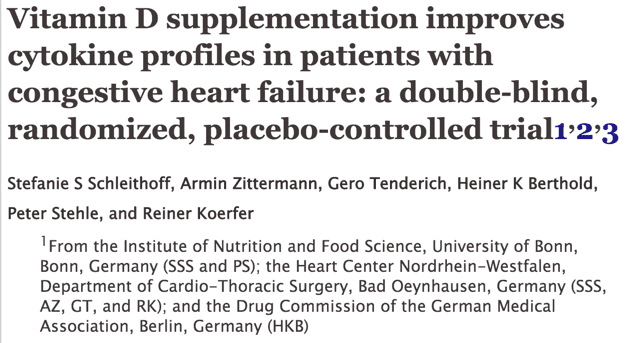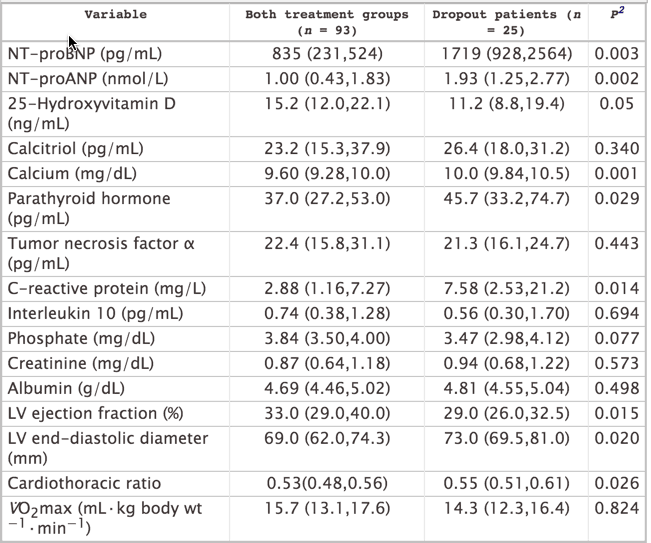
According to Web M.D., 6 million Americans suffer from heart failure.
And even with this number of patients, we don’t really know what causes heart failure, or why some people have it and why other people never suffer from heart failure.
What we do know so far is that heart failure is tied to fluid retention in the body.
Since we don’t know why it happens (yet), the treatments for heart failure usually focus on trying to get rid of all that excess water.
This means that a lot of the treatment plans use diuretics to cause you to excrete the water.
In other words… these medications cause you to pee more, and therefore hopefully deplete your tissues of this excess water.
I have another theory.
I believe that heart failure is caused by having too many stress hormones, especially estrogen.
Estrogen causes cells to swell up with fluid.
And estrogen is hard to detect in a blood test, because it hides out in the cells.
However, the study in today’s newsletter monitors
vitamin D deficiency and why it seems to be tied in with heart failure.
 Most people know that the best way to get vitamin D is from the sun.
Most people know that the best way to get vitamin D is from the sun.
And how we get vitamin D from the sun is an incredibly complex process.
When when you’re out in the sun, your skin and surface cells process various chemicals with light and turn these chemicals into other chemicals which eventually become vitamin D.
However if you do not spend time near naked in sunlight virtually every day, you may have vitamin D deficiency, especially in the winter time if you’re in a colder climate.
And nowadays even people who are in the tropics are spending most of their time indoors, so it’s conceivable they have vitamin D deficiency as well.
You can also get vitamin D from some foods, especially from liver.
But since we don’t eat enough of the naturally vitamin D rich foods, there are efforts to make vitamin D more available in foods that everyone eats.
One effort to get people to get more vitamin D is that they put vitamin D into milk, in order to force people to drink it and get some vitamin D.
What I’ve come to realize is that this vitamin D is in a toxic form, but that’s another newsletter.
So that’s the story on vitamin D.
So let’s look at the study and see how vitamin D may tie in the heart failure.
The study was done in China.
The levels of vitamin D in the research subjects are quite shocking.
As reported, high prevalence of vitamin D insuffIciency (<30ng/mL) was found in 84% males and 89% females in China.
The US Government’s Medline Plus (part of the National Institutes of Health) currently says that this is an okay vitamin D level.
According to them:
Many experts recommend a level between 20 and 40 ng/mL. Others recommend a level between 30 and 50 ng/mL.
Then again, many experts who may know more about the subject recommend a level of vitamin D from 50 to 100 ng/mL.
I am convinced that this is a healthier level.
The results of the study help show us why.
So now I’m back to the study:
We found levels of plasma vitamin D were lower in all groups of CHF patients compared to AMI [Acute Myocardial Infarction patients], aged, and healthy donors.
This finding is what led them to tie in low vitamin D levels with heart disease.
There’s little doubt about the fact the chronic internal inflammation causes heart disease.
There can be a lot of argument about how this inflammation happens, or why it happens.
But it’s been found that in people with heart disease, it starts with internal inflammation that goes on and on, eventually leading to multiple organs failing.
Given that, these researchers started to look at the inflammatory response that was tied in with heart failure.
They found that in low vitamin D people, they had more inflammation:
Taken together, this work demonstrates that decreased vitamin D is correlated with decreased T-reg and increased TH-17 cells in heart failure patients.
How that translates is that T-reg cells are tasked with helping to regulate your immune system, and part of that job is to lower inflammation.
On the other hand, TH-17 cells are immune cells which raise inflammation.
Patients who had low vitamin D levels were more likely to get heart failure, and the low vitamin D resulted in more inflammation in the form of higher numbers of TH-17 cells, and lower numbers of T-reg cells.
It may be possible that raising vitamin D levels protect your heart by lowering inflammation.
But how should you raise your vitamin D level?
You might want to start by taking vitamin D3, which is a safer form of vitamin D.
It may be better to spend 15 to 30 minutes a day in full sun wearing only shorts or a bikini.
But if you can’t do that, taking oral vitamin D3 may be a good substitute.
So to find the best way to raise your vitamin D level, let’s look at another study.
Now that we’ve got our theory about inflammation figured out, and it’s been verified in a good Chinese study, let’s see how supplementing vitamin D helps lower inflammation and lowers heart disease.
 This study answers the exact question that we just asked.
This study answers the exact question that we just asked.
They gave vitamin D to a number of people suffering from heart failure to see what would happen.
As they note at the beginning of the paper,
Abnormal cardiac function is responsible for the inability of the heart to supply adequate blood flow, and therefore oxygen delivery, to peripheral tissues and organs or to do so only with elevated filling pressures.
They note that people with heart failure have low vitamin D.
And also that they have HIGH levels of parathyroid hormone, which kicks in when you have low calcium levels in the body.
Parathyroid hormone (PTH) is a protective hormone that protects the body in some ways but also hurts the body in others.
You need to have enough parathyroid hormone for it to do its job, but no extra to run amuck.
What you want is to get enough calcium and vitamin D, so you have LOW parathyroid hormone levels.
The study gave some patients vitamin D and calcium, some patients only calcium and some patients a placebo containing NO vitamin D or calcium.
They lost some patients who dropped out.
Because as these patients got the vitamin D, their health got worse, and so they dropped out of the study.
These patients had VERY high parathyroid levels already, and high calcium in their blood, and LOW vitamin D levels.
The patients who dropped out prematurely because their health status worsened markedly had higher serum PTH concentrations and lower vitamin D concentrations at baseline.
It is very interesting that some patients got WORSE with the vitamin D.
I think it’s because they should have received vitamin K2 also, which didn’t happen.
Vitamin K2 works closely with vitamin D & calcium in a number of functions.
One of the roles of vitamin K is to direct where vitamin D goes, so without it, the additional vitamin D had adverse effects.
This is a very flawed study for this reason, but it’s all we’ve got.
I think the vitamin K2 would have turned these patients around and restored their health.
Look at how low vitamin D levels were for these folks, though.
15 for the treatment group, 11 for the dropouts. That is VERY VERY low.
 But what I am very unhappy with is that they didn’t include vitamin K2.
But what I am very unhappy with is that they didn’t include vitamin K2.
Missing vitamin K2 is almost criminal these days.
Nevertheless, the study DOES show that the vitamin D helped lower inflammation:
Vitamin D can serve as an anti-inflammatory agent and may therefore be useful for the management of heart failure.
Moreover, vitamin D was able to suppress serum concentrations of parathyroid, a hormone that may contribute to impaired cardiac function.
Calcium supplementation may result in a slight improvement of hemodynamic variables.
Here’s what you need to know.
Personally I aim for around 70 or 80 for my level of vitamin D3. I don’t think going over that is all that smart.
I’m not afraid of taking large amounts of vitamin D3, to get there.
But I always take all the vitamins that go along with vitamin D3, including vitamin A, vitamin E, and vitamin K2.
Of all those, vitamin K2 may be most important and is most often neglected.
Vitamin K2 helps the body put calcium where it belongs– into the bones.
Vitamin D3 increases calcium absorption, so you need vitamin K2 to help the body deal with the increased calcium load from the vitamin D3.
And you may also need some supplemental calcium.
Always talk to your doctor FIRST about any changes like this, before you make them.
And do your homework!
Citations
Heart Disease and Congestive Heart Failure
http://www.webmd.com/heart-disease/guide-heart-failure
Vitamin D Deficiency Contributes to the Reduction and Impaired Function of Naïve Regulatory T Cell in Chronic Heart Failure
http://www.hindawi.com/journals/jir/2015/547697/abs/
25-hydroxy vitamin D test
https://www.nlm.nih.gov/medlineplus/ency/article/003569.htm
Vitamin D Deficiency Contributes to the Reduction and Impaired Function of Naïve Regulatory T Cell in Chronic Heart Failure
http://www.hindawi.com/journals/jir/2015/547697/
Vitamin D supplementation improves cytokine profiles in patients with congestive heart failure: a double-blind, randomized, placebo-controlled trial
http://ajcn.nutrition.org/content/83/4/754.full
Click for more information on Vitamin D Deficiency, for information on Natural remedies, or for more on how Vitamin D deficiency affects us.
